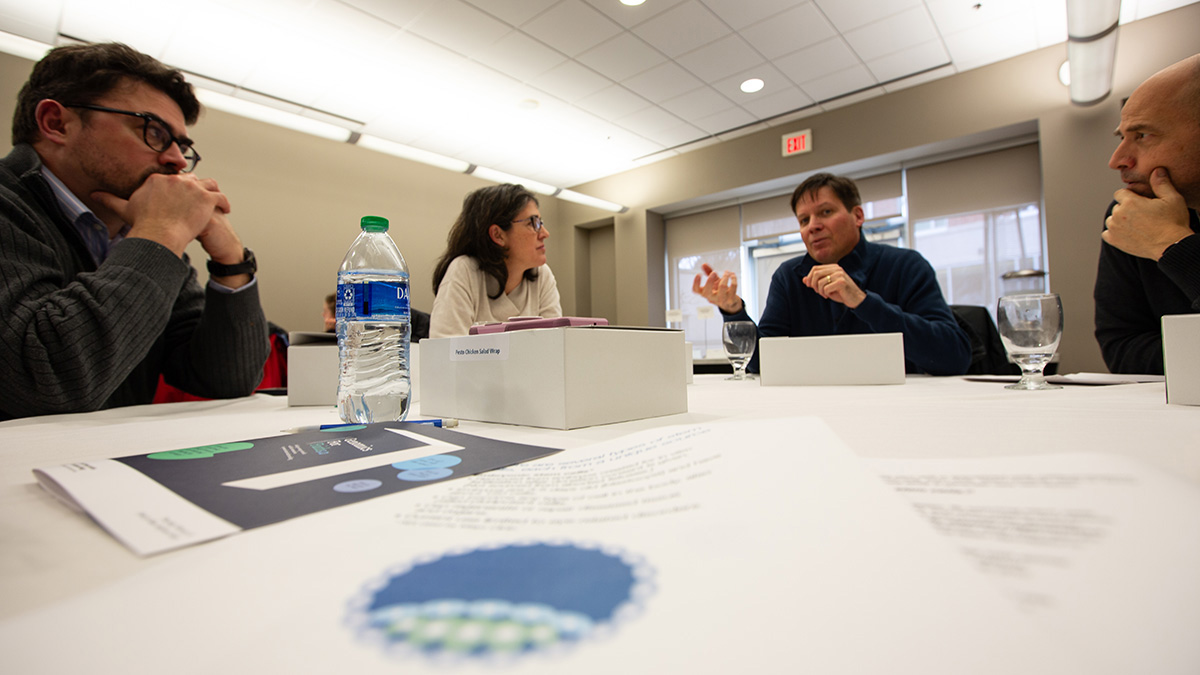Genomics for Faith explores potential and ethics of stem cell research

Round table discussion at the third Genomics for Faith workshop with IGB researchers and community faith leaders / Mirhee Lee
Recently, the Carl R. Woese Institute for Genomic Biology hosted the third installment of its Genomics for Faith workshop series — a part of the broader Genomics forTM program designed to disseminate scientific knowledge and foster interdisciplinary discussions on emerging scientific technologies with various professional sectors of society.
The Genomics for Faith workshop series, supported by the Wayfarer Foundation, aims to bridge the gap between scientific knowledge and faith-based perspectives. By fostering dialogue and mutual understanding, these workshops serve as a platform for discussing complex scientific topics in the context of different faith perspectives.
Building upon previous discussions on the definition of life and gene-editing technology, the latest workshop, held at the I Hotel, delved into the realm of stem cell research. Stem cells, known for their remarkable capacity to differentiate into various cell types, hold much potential for medical applications. Stem cells can be used to regenerate and repair diseased or damaged tissues, and to create drugs to treat degenerative conditions.
Prior to the workshop, several faith leaders who volunteered to co-lead workshop discussions had the opportunity to tour university labs, and gain firsthand knowledge of stem cell research methodologies and facilities, facilitating informed discussions during the workshop.
Throughout the workshop, participants, including both scientists and faith leaders, engaged in group discussions while enjoying lunch. Expert researchers Sara Pedron-Haba (RBTE) and Haiting Ma, who had met with faith leader discussants prior to the workshop, also joined in the discussions to offer their insights. Pedron-Haba, a research assistant professor of chemical and biomolecular engineering, specializes in the design and implementation of biomaterial platforms to investigate the mechanisms of brain cancer progression and evaluate potential therapies. Ma, an assistant professor of cell and developmental biology, investigates how cells interact with their environments inside the body, including how a cell’s surroundings determine what kind of characteristics it will develop.
To further facilitate discussions, participants were given comprehensive packets containing fundamental scientific information on stem cells, such as the different types, how they are sampled, and their uses in medicine and research.
Throughout the discussions, a consensus emerged that the controversy surrounding stem cell research primarily stems from the sourcing of embryonic stem cells. It became evident that a prevailing misconception in society equates the term "stem cell" with "embryonic stem cell," when in fact stem cells are sourced from numerous adult organs, tissues, and blood as well.
While embryonic stem cells have garnered significantly more attention due to their versatility in medicine compared to other stem cell types, stem cells from alternative sources, such as bone marrow or organs, still offer promising avenues for therapeutic development without ethical dilemmas. Furthermore, stem cells from adult bone marrow and organs are already commonplace in medical treatments today.
Discussions also featured praise for ongoing efforts to bioengineer stem cells by reprogramming adult cells to act like embryonic stem cells, potentially alleviating ethical concerns associated with embryonic stem cell research while advancing medical innovation.
Faith leaders emphasized the crucial role of effective communication in fostering broader acceptance and understanding of stem cell research. Scientists and faith leaders alike agreed that by informing the public on the tangible benefits to society and emphasizing the ethical frameworks guiding their work, scientists can better inform public discourse on and perception of the use of stem cells in research.
The Genomics for Faith workshop continues to exemplify the power of interdisciplinary dialogue in navigating complex scientific and ethical terrain. By fostering mutual respect and understanding between scientific and faith-based communities, such initiatives pave the way for transformative advancements that benefit humanity as a whole.
